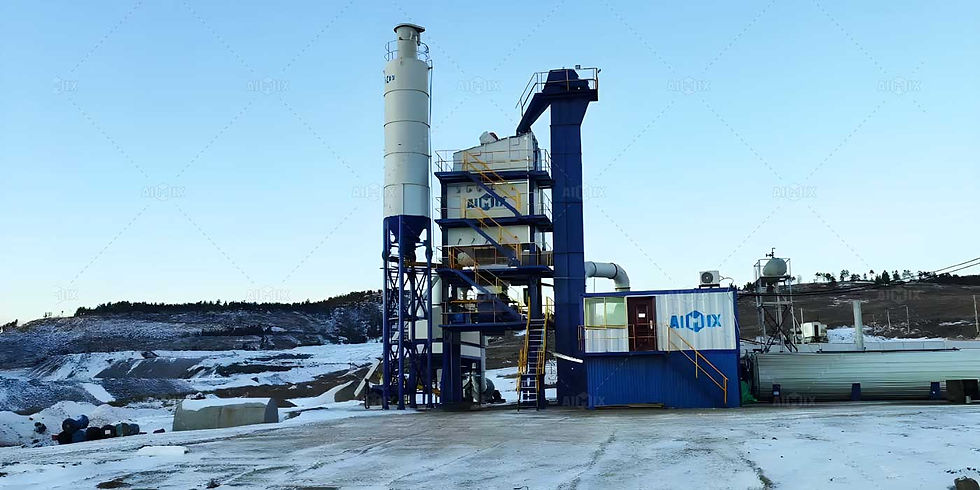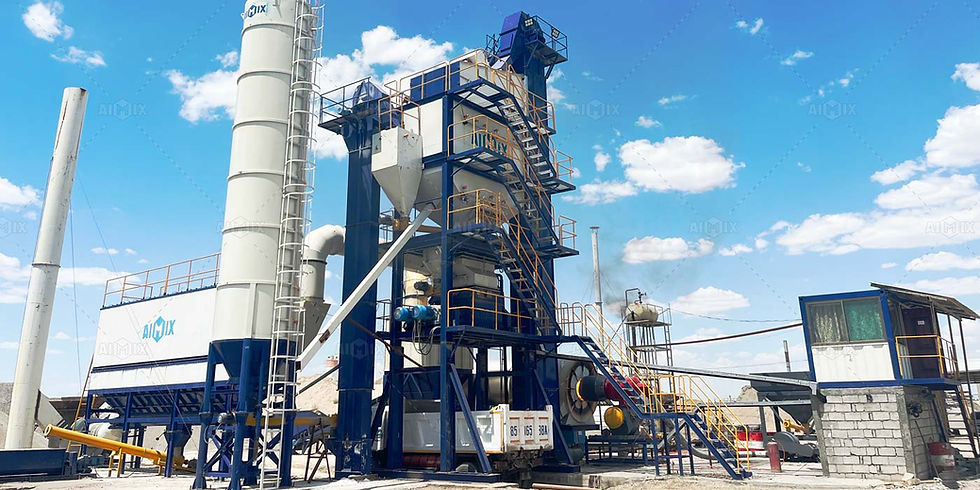Which Asphalt Mixing Plant Is Ideal for Village Road Upgrades Requiring 200 Tons of Asphalt per Day?
- aimixglobal5
- Jun 17, 2025
- 3 min read
Upgrading village roads is one of the most common infrastructure projects in developing regions. Whether initiated by local governments or small contractors, these projects require a reliable and cost-effective asphalt supply. If you're looking to produce around 200 tons of asphalt per day, choosing the right asphalt mixing plant is crucial. In this article, we explore practical plant options that match this demand, explain what to consider before investing, and help you make an informed decision that supports both production efficiency and project profitability.

Why the Right Asphalt Plant Matters for Village Road Projects
Village road upgrades often involve short to medium-length paving sections, typically ranging from 1 km to 5 km. To keep the project on track, the asphalt mixing equipment must provide consistent output, manageable daily production, and easy operation. Producing 200 tons per day is not an industrial-scale requirement, but it still demands a plant that is stable, durable, and suited for continuous use under site-specific conditions.
Moreover, rural road projects often operate with tighter budgets and limited labor. As a result, contractors need machines that are not only efficient but also easy to transport, install, and maintain. That’s where selecting the right asphalt mixing plant becomes a key factor in project success.
Estimating Production Needs: Why 200 Tons/Day Is a Practical Benchmark
Before choosing a plant, it’s important to confirm your daily asphalt needs. In most village paving projects, a single 8- to 10-hour shift is standard. To meet 200 tons/day, the plant should deliver approximately 20–25 tons per hour of continuous asphalt production.
This demand aligns well with small to medium capacity asphalt mixing plants. It also allows you to complete paving steadily without overburdening your labor force or fuel budget. Therefore, the goal is to find a mini asphalt plant for sale with a 20–40 tph capacity range that balances efficiency with investment.

Best Asphalt Plant Options for Producing 200 Tons per Day
Option 1: ALT Series – Small Drum Asphalt Mixing Plant
The ALT series is a continuous drum mix type that is compact, easy to move, and fast to install. It’s ideal for remote rural projects. The ALT40 model, with a 40 tph capacity, can comfortably produce 200 tons of asphalt in a single shift. Its simple structure reduces maintenance costs, while its continuous mixing ensures a stable output throughout the day.
Option 2: ALYJ Series – Mobile Batch Asphalt Plant
If you require better control over mix quality and more flexibility in formulation, the ALYJ series is a suitable mobile batch-type option. The ALYJ40 model, rated at 40 tph, offers batch-level precision and is mounted on mobile chassis for convenient site transfers. This model suits contractors who often move between village sites or manage multiple small projects at once.
Option 3: ALQ60 – Stationary Batch Mix Asphalt Plant
For contractors with longer-term rural development programs or fixed production bases near project locations, the ALQ60 stationary asphalt batch plant is worth considering. While its hourly capacity exceeds daily needs (up to 60 tph), you can operate it part-time to reach 200 tons/day efficiently. It delivers higher mix quality and is better suited for public road standards or stricter government contracts.

Key Factors to Consider Before Making a Decision
After identifying suitable models, it’s essential to evaluate based on actual jobsite conditions. The decision shouldn’t rely on capacity alone. Here are some other factors to weigh:
Fuel Type Availability: Some rural areas have easier access to diesel or coal, which affects burner choice.
Mobility Requirements: Projects in several villages or remote areas benefit from mobile or modular units.
Maintenance & Labor: Simpler designs reduce training needs and speed up routine checks.
Climate Conditions: Dust collection, drying efficiency, and burner configuration should match local humidity and temperature levels.
By balancing these factors with your production target, you ensure long-term productivity and lower project risks.
Why Choose Us for Your Asphalt Mixing Plant in Indonesia?
We understand the real challenges you face in road construction projects across Indonesia. Whether you're a local contractor or a government partner, our asphalt mixing plants are built to support your goals — not just in performance but also in after-sales support.
We offer tailored solutions for rural and urban road paving. With local warehouses, parts inventory, and service engineers based in Indonesia, we ensure quick delivery and reliable technical assistance. From transport to installation, training to maintenance, we stand by your side at every stage of your project.

Ready to Upgrade Village Roads More Efficiently?
If you’re planning to produce 200 tons of asphalt daily for rural paving projects, we’re here to help you find the most cost-effective and reliable solution. Whether you need a compact drum plant or a mobile batching unit, our team will recommend the best fit for your specific needs.
Contact us today to discuss your project goals. Let’s build better village roads, one reliable asphalt plant at a time.



Comments